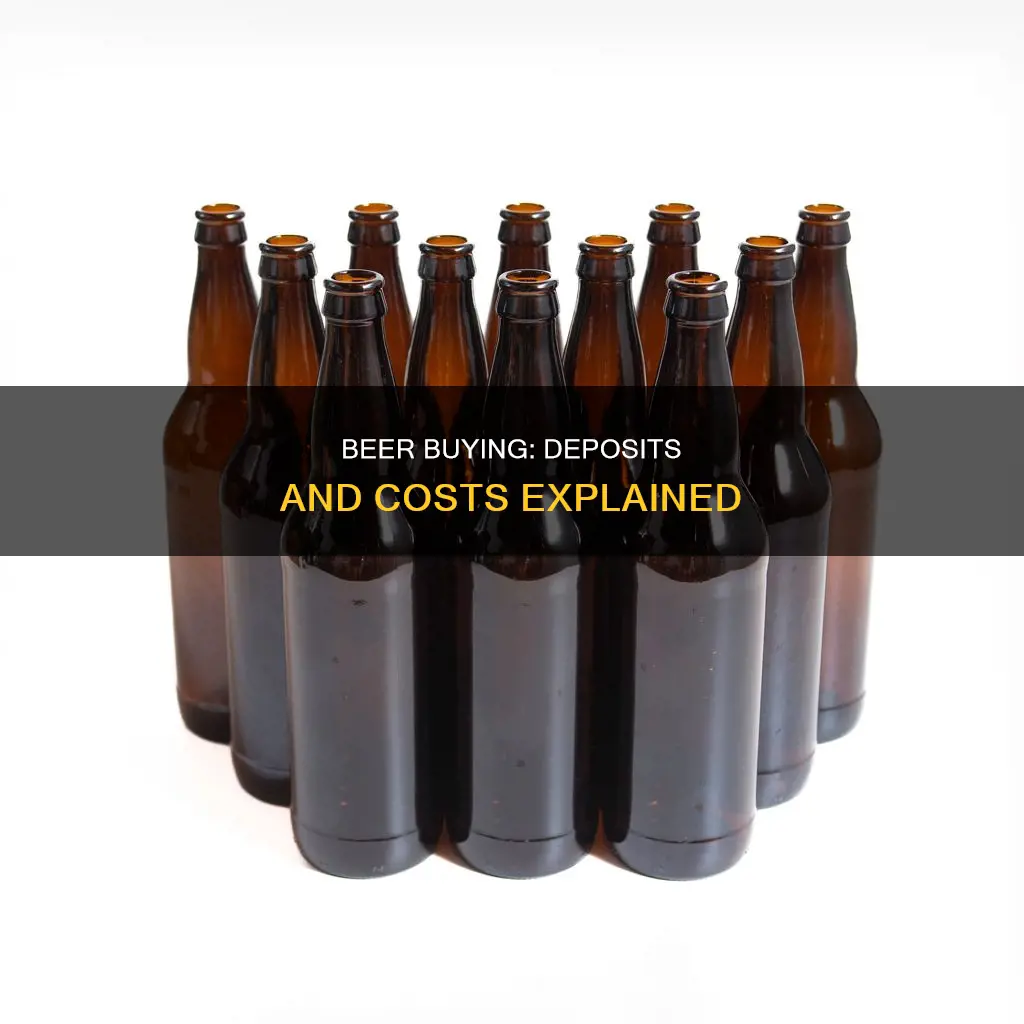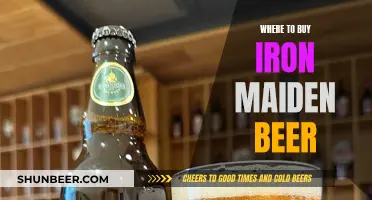
The cost of buying beer includes a deposit that is refunded when the empty container is returned to a retailer or redemption centre for recycling. This deposit is not an additional cost but is included in the total price of the beverage. For example, if a case of 12 beers costs $30 and there is a deposit of 10 cents per can, the total cost will be $31.20. The deposit is intended to encourage consumers to return their containers for recycling, thus reducing litter and increasing recycling rates.
| Characteristics | Values |
|---|---|
| What is a bottle bill? | Container deposit law |
| Who does it apply to? | Beer, soft drink and other beverage containers |
| Why is it used? | To ensure a high rate of recycling or reuse |
| Who does it benefit? | Producers, consumers, and the environment |
| Where is it used? | 10 states in the US, every Canadian province, and other countries |
| How does it work? | A deposit is paid to the distributor by the retailer for each can or bottle purchased. The consumer pays the deposit to the retailer when buying the beverage and gets it back when returning the empty container. |
| How much is the deposit? | It varies depending on the location and the type of beverage but is usually between 5 and 10 cents. |
What You'll Learn

What is a deposit return scheme?
A deposit return scheme (DRS) is a surcharge on a product when purchased and a rebate when it is returned. It is a market-based instrument to address externalities, providing an incentive for consumers to properly dispose of products.
DRS is commonly used for beverage containers, with a deposit added to the price of a drink, which is then refunded when the empty bottle or can is returned for recycling. This encourages consumers to return their containers, preventing them from ending up in oceans, streets, and landfills.
DRS can be either voluntary or mandated by legislation. They are typically established through legislation passed by state or national governments.
DRS provides a financial incentive to return drink containers, communicating that they have value and are not trash. DRS has been proven to reduce beverage litter and increase recycling rates. For example, in Michigan, the average return rate since 1990 has been 93%.
DRS also helps to reduce the reliance on raw materials to produce new beverage containers. This is known as closed-loop recycling, where used containers are recycled back into new containers, rather than used for lower-quality uses like landfill cover.
DRS can be returned to retailers, redemption centres, or reverse vending machines. Reverse vending machines are user-friendly machines with advanced sensors that recognise the unique properties of containers and prevent fraud in the system.
Buying Beer at Kentucky Gas Stations: What's the Deal?
You may want to see also

How does a deposit-refund system work?
A deposit-refund system, also known as a bottle bill, is a law that requires a minimum refundable deposit on beverage containers to ensure a high rate of recycling or reuse. The deposit-refund system was initially created by the beverage industry to guarantee the return of their glass bottles to be washed, refilled, and resold. The deposit is added on top of the price of a beverage and is repaid to the consumer when the empty can or bottle is returned for recycling. This method has been proven to reduce litter and increase recycling rates.
The deposit-refund system works as follows:
- When a retailer buys beverages from a distributor, a deposit is paid to the distributor for each can or bottle purchased.
- The consumer pays the deposit to the retailer when buying the beverage.
- When the consumer returns the empty beverage container to the retail store, redemption center, or reverse vending machine, the deposit is refunded.
- The retailer recoups the deposit from the distributor, plus an additional handling fee.
- Distributors and bottlers can offset the costs by selling scrap cans and bottles and by making short-term investments with the deposits collected from retailers.
- Deposits that are not redeemed are often kept by distributors or bottlers to cover the costs of the system or are used to fund environmental programs.
The deposit-refund system has been implemented in various countries and jurisdictions around the world, with the goal of encouraging recycling, reducing litter, and conserving natural resources.
Buying Beer in Kansas on Thanksgiving: What You Need to Know
You may want to see also

How much is the deposit for beer bottles?
The deposit amount for beer bottles varies depending on the region and the size of the bottle. In some places, the deposit may be included in the cost of the beer, while in other places, it may be listed separately. Here is a breakdown of the deposit amounts for beer bottles in different regions:
United States
In the United States, the deposit amount for beer bottles varies by state. Here are some examples:
- Vermont: Passed the first bottle bill in 1953, prohibiting the sale of beer in non-refillable bottles. The current deposit rate is 5 cents for plastic, metal, and glass containers and 15 cents for most liquor and wine bottles.
- Oregon: Passed the first bottle bill in 1971, requiring refundable deposits on all beer and soft drink containers. The deposit rate is 10 cents.
- California: Enacted in 1981, California's bottle bill charges a 5-cent refundable deposit on containers less than 24 US fluid ounces (710 ml) and 10 cents for containers 24 US fluid ounces or greater.
- New York: New York's bottle bill has been in place since 1983, with a 5-cent deposit on plastic, metal, and glass containers 3.78 litres or less.
Canada
In Canada, the deposit amount for beer bottles also varies by province. Here are some examples:
- Ontario: The Ontario Deposit Return Program (ODRP) covers wine, spirit, and beer containers over 100 ml. The deposit is refundable and varies depending on the size and type of container.
- British Columbia: The deposit legislation expanded to include all ready-to-serve beverages. The deposit rate is 10 cents for single-use beverage containers.
- Quebec: Quebec's deposit-return system covers beer and carbonated soft drink containers. Deposits range from 5 cents to 20 cents depending on the size, material, and content of the container.
Europe
In Europe, the deposit amount for beer bottles varies by country. Here are some examples:
- Germany: The deposit legislation covers plastic, aluminium, and glass containers for various beverages, including beer. The deposit for reusable glass bottles is usually between 8 and 15 cents.
- Denmark: The deposit levels for beverage containers vary depending on the type and size. Disposable aluminium and glass containers under 1 litre have a deposit of 1 Danish krone.
- Sweden: There are deposits on almost all ready-to-serve beverages, including beer. Plastic bottles under 1 litre have a deposit of 1 Swedish krona, while glass bottles of 33 centilitres have a deposit of 0.6 kronor.
Other Countries
- Australia: The state of South Australia charges a refundable deposit of 10 cents per drinks carton, can, or bottle.
- New Zealand: There is no widespread deposit system, but some beer bottles are a notable exception.
- Israel: There is a 0.30-shekel deposit on beverage containers over 100 millilitres and under 5 litres, excluding dairy products. Most 500 ml beer bottles have a deposit of 1.20 shekels.
Buying Beer in Missouri: Morning Restrictions and Laws
You may want to see also

Where can I return beer bottles for a refund?
Returning beer bottles for a refund is made possible through container-deposit legislation, also known as a container-deposit scheme, deposit-refund system, or bottle bill. This legislation requires a minimum refundable deposit on beer, soft drink, and other beverage containers to ensure a high rate of recycling or reuse.
In the United States, there are currently ten states with bottle bills in place: California, Connecticut, Hawaii, Iowa, Maine, Massachusetts, Michigan, New York, Oregon, and Vermont. In these states, you can return your empty beer bottles to a retailer that sells them or to a redemption center for a refund.
In Canada, all provinces except Nunavut have some form of deposit-refund system. For example, in Ontario, you can return your empty beer containers to The Beer Store, which partners with the Ministry of Finance through the Ontario Deposit Return Program (ODRP). This program covers all wine, spirit, and cooler containers over 100 ml sold through LCBO stores and Ontario winery retail stores, as well as beer containers over 100 ml sold outside The Beer Store system.
In the United Kingdom, Scotland has implemented a deposit return scheme, and Wales, Northern Ireland, and England are considering similar programs.
Other countries with deposit-refund systems in place include Australia, Austria, Croatia, the Czech Republic, Denmark, Estonia, Finland, Germany, Hungary, Iceland, Lithuania, the Netherlands, Norway, Portugal, Spain, Sweden, Switzerland, and Taiwan.
It's important to note that the specific locations for returning beer bottles may vary by region and retailer, so it's recommended to check with your local beverage retailer or government resources for the most accurate information.
Ohio's Non-Alcoholic Beer Buying Laws for Under 21s
You may want to see also

What happens to unclaimed deposits?
When consumers choose not to redeem their used beverage containers, the deposit money is considered "unclaimed". In some places, other terms used are abandoned and unredeemed. Depending on the location, unclaimed deposit funds are retained by beverage distributors, state agencies, or a combination of the two.
State-managed systems
In California and Hawaii, state agencies manage and control the finances of the beverage container deposit system. In California, the agency is CalRecycle; in Hawaii, it is the Department of Health. These agencies collect deposits from distributors when the beverages are sold to retailers. The bottler or distributor pays the deposit directly into a state-managed fund and collects the deposit from the retailer. The retailer then collects the deposit from the consumer. Refunds are paid to the consumers out of the state-managed fund, which is also used to pay for program operation and administration. In both states, 100% of unclaimed deposit monies are used by the state agencies to manage the system, educate the public, and promote markets for recycled materials.
Beverage industry-managed systems
In the other eight US deposit states, operations and finances are managed by the beverage industry, and unclaimed deposits are either retained by distributors or escheated by the state (in full or in part). In Iowa, beverage bottlers and distributors keep all unclaimed deposits. In Oregon, the bottle bill system is operated by the Oregon Beverage Recycling Cooperative (OBRC), which retains all unredeemed deposits to fund bottle collection.
State government
The deposit laws in Connecticut, Massachusetts, New York, Maine, Michigan, and Vermont allow partial or full escheats, whereby distributors and bottlers are required to turn over all or a portion of unclaimed deposits to the state.
Other approaches
In some places, unclaimed deposits are returned to the state's general fund. In others, they are allocated to environmental initiatives, recycling programs, or program administration.
Buying Beer Abroad: Underage Americans Overseas
You may want to see also
Frequently asked questions
A bottle bill is another way of saying "container deposit law". It requires a minimum refundable deposit on beer, soft drink and other beverage containers to ensure a high rate of recycling or reuse.
When a retailer buys beverages from a distributor, a deposit is paid to the distributor for each can or bottle purchased. The consumer pays the deposit to the retailer when buying the beverage. When the consumer returns the empty beverage container, the deposit is refunded.
In most states, unclaimed deposits remain the property of the distributors and bottlers. In Michigan, Massachusetts, Hawaii and California, the state collects all of the unredeemed deposits, which are then used to fund environmental programs.
The deposit for alcoholic beverage containers in British Columbia is 10 cents.
Beer containers can be returned to any government-owned liquor store or Return-It bottle depots for a full or partial refund of your deposit.







